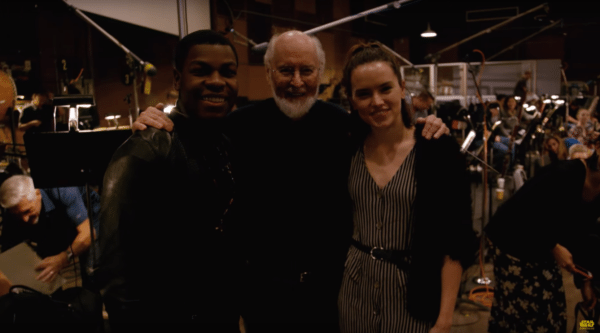Sean Wilson was in attendance during the London Symphony Orchestra’s stirring tribute to a soundtrack icon…

John Williams may not have been physically present during the Royal Albert Hall’s spectacular Friday concert, hospitalised as he was by a sudden illness. But his presence coursed through every note delivered by the vigorous London Symphony Orchestra, working under the energetic baton of last-minute replacement conductor Dirk Brosse (a friend of Williams who conducted the Star Wars live concerts between 2009 and 2011).
Dismaying as it was that Williams couldn’t attend (this would have been the first London appearance in 22 years for the 86-year-old composer), his absence conspired to charge the vast Albert Hall with added power. Prior to the event the hashtag #ApplauseForJohn, established by the LSO, reinforced the extraordinary regard in which Williams is held. But truly, no such social media gimmicks were needed – never have I attended a film music concert where the audience spontaneously rose to their feet in ovation after practically every track.

Image credit: Christie Goodwin
Such is Williams’ skill in imprinting on audiences of all generations – even when he isn’t leading, the strength of the composer’s personality resonates in the fluttering of the woodwinds, the elegiac strains of the string section and the seat-gripping force of the French horns. Much orchestral soundtrack music today is composed by people who are musically proficient but, crucially, poor storytellers. When one watches Williams’ music performed live, one cannot help but marvel at the dialogue established between the constituent parts of the orchestra: all of the instruments are audibly communicating with each other to convey the flow of a particular scene, an overarching emotion, or the development of a character’s personality. It never devolves into noise for the sake of it.
Of course, this extraordinary skill didn’t arrive ex nihilo. It wasn’t until the end of the 1960s that jazz musician and former session player Johnny Williams began to morph into the composer of thunderous, leitmotif-laden epics, following his award-winning work as an arranger on Fiddler on the Roof and Goodbye Mr. Chips. In fact, it was during the lengthy period when Goodbye Mr. Chips was being recorded in London that Williams’ love of robust orchestral symphonies became crystallised. It was also the first step in establishing Williams’ connection with London, not to mention the LSO that went 0n to perform Raiders of the Lost Ark and the first six Star Wars movies.

Image credit: Christie Goodwin
Soundtrack producer Mike Matessino, a veteran of Williams album re-releases including Jaws and Dracula, says it all stems from Williams’ former mentor Andre Previn. Having grown jaded with writing for Hollywood movies, Previn left America to become the primary conductor for the LSO, just as Williams was beginning his own ascent onto the A-list. It was at that point a valuable connection was made.
“Andre had written a complete score with his wife for the musical Goodbye Mr. Chips,” Matessino explains, “which was ultimately tossed out and the experience caused him to say he’d had enough of Hollywood. Leslie Bricusse was the songwriter and Andre recommended that John arrange it. So that was all going on around 1967. Sure enough, John came over to London and arranged the film. It was a transformative experience for him because he was over here for quite a long time. Certainly there was a long stretch from January to June 1969 when John was located in a flat in Belgravia by himself. Bricusse had gone on to do Scrooge while John was hanging around doing the orchestrating. He was also hanging around with George Korngold, going to concerts and the sessions for the Battle of Britain, composed by William Walton, and generally just absorbing all the energy of the classical community. He emerged from that period I think with the sound that we all came to know in the 1970s.”
Matessino continues: “Williams was always actively looking for opportunities to come back to London. Chips was followed by Fiddler on the Roof, then another year and half went by until the production of television film Jane Eyre. Then came Star Wars, by which time Andre Previn was head of the LSO. So there was already that friendship and collaboration established. After the first Star Wars there then followed an extraordinary stream of yet more classic scores that we all know and love.”
Certainly, that rich sound was very much evident in a Royal Albert Hall playlist that didn’t throw out many surprises, but played to the stalls in rousing fashion. From the mythical sweep of Star Wars, ranging from the militarism of The Imperial March to the beautiful delicacy of Yoda’s theme, to the brassy punch of Superman and the heart rending solo violin anguish of Schindler’s List (performed by orchestra leader Carmine Lauri), it was a powerful summation of an astonishing career. At various stages, perhaps in acknowledgement of the absence on the podium, various players from the orchestra emerged to share their nostalgic stories of the impact Williams has had on their lives and careers.
The knowledge of Williams’ ill-health (although he was apparently listening on Classic FM in the hospital) underlined the event with appropriately humbling poignancy. At 86, Williams is not destined to be with us forever, but he promises to leave behind one of the most remarkable legacies of any 20th century artist.
Matessino says it best: “John won’t live forever, but his music will.”

Image credit: Christie Goodwin
Sean Wilson











